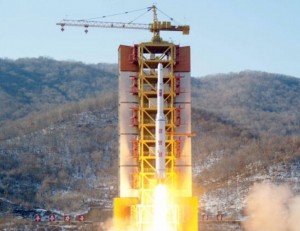
SEOUL—North Korea’s failed attempt to launch an intermediate-range ballistic missile on Friday is not the military set back it may seem, analysts said. It is instead, part of the natural progression in the development of an advanced nuclear weapons program.
“While I think people will look at the failure and they will conclude that that is a reason not to be worried about North Korea, the reality is that their missile scientists will learn a lot even from the failure,” said Jeffrey Lewis, the director of the East Asia Nonproliferation Program at the Middlebury Institute of International Studies in California.
Musudan medium-range missile
There has been growing concern over North Korea’s increasing missile and nuclear capabilities, as the country continues to threaten its neighbors, South Korea and Japan, as well as the United States.
It is presumed that the missile North Korea unsuccessfully tested on Friday was the Musudan medium-range ballistic missile, which had not been tested in the past.
Observers have been anticipating that North Korea would mark the Friday birthday of Kim Il Sung, the country’s first president and grandfather of current leader Kim Jong Un, with the launch of a mid-range missile.
Earlier this week the South Korean military detected the deployment of this type of missile near the east coastal city of Wonsan in the North.
This medium range missile has a potential range of 3,000-4,000 kilometers and could reach targets as far away as Guam.
The Musudan is based on an old Soviet submarine launch ballistic missile design that the North converted to be fired from a mobile land-based launcher.
Officials in Seoul and Washington concluded the attempted launch failed but declined any further comment. Analysts however said trial and error are part of the development process.
“Taking that design and converting it to a road mobile version is a difficult task and when they do conduct the flight test like this, they learn. They collect data and then they can go back and correct the mistakes,” said Daniel Pinkston, a lecturer in international relations with Troy University in Seoul.
Hype or not
North Korea has in the past been accused of exaggerating its advanced military capabilities.
Pyongyang recently claimed to have successfully conducted a submarine-launched ballistic missile test, but Lewis and other experts at the James Martin Center for Nonproliferation Studies in California, studied satellite images and came to a different conclusion.
“North Koreans declared that it was an enormous success and we were able to demonstrate quite conclusively that it exploded. So the North Koreans will definitely lie to exaggerate their capabilities,” said Lewis.
Officials in Washington and Seoul also discount Kim Jong Un’s claim that his country’s fourth nuclear test in January was that of a hydrogen bomb. According to their assessment the bomb blast was not powerful enough to be that of a hydrogen bomb. Although they did say it was more powerful than past atomic bomb tests and could have incorporated some hydrogen bomb components.[xyz-ihs snippet=”adsense-body-ad”]
North Korea’s claim to have developed the capability to miniaturize nuclear warhead to fit on a ballistic missile is viewed as a credible threat by military leaders in South Korea and the United States, but it has not yet been verified.
North Korea also made an unverified claim that it had successfully tested an engine designed for a long-range intercontinental ballistic missile that could reach the U.S. mainland. While Pyongyang has demonstrated the capability to launch missiles or rockets into space, analysts said it has not yet developed the re-entry vehicle capability needed for successful long-range missile strikes.
Some may look at these failed weapons tests and over-hyped claims and conclude that North Korea’s repressive command and control structure has hampered this technological development just as it has severely restricted economic growth in the poverty stricken country.
But Pinkston said both Kim Jong Un and his father Kim Jong Il have prioritized missile and nuclear development programs and maintained a strong long-term commitment to them, despite the high costs imposed on the North Korean people.
“They can select all the best people. They can squeeze resources out of the economy and they’ve been able to sustain that dedication for decades,” he said.
The United Nations Security Council has banned North Korea from developing nuclear and ballistic missile technology. China, the North’s key ally, has urged the Kim Jong Un government to return to international talks and dismantle its nuclear program for economic assistance and security guarantees.
In March, the United Nations imposed tough new sanctions to pressure Pyongyang to comply with these restrictions, but North Korea has responded by firing of a series of short and mid-range missiles almost on a weekly basis.
Youmi Kim in Seoul contributed to this report.
Source: VOA [xyz-ihs snippet=”Adversal-468×60″]
